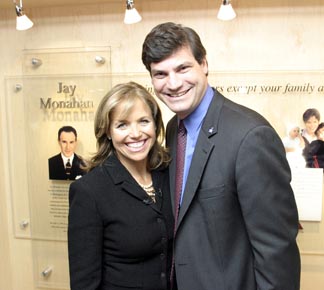Katie Couric salutes 'heroes' who treat cancer at Jay Monahan Center
By Melissa Hantman '01

NEW YORK -- "You are the unsung heroes and heroines of our society," media star Katie Couric, co-anchor of NBC's "Today" show, said in a moving speech to doctors and other health-care professionals gathered to discuss crucial updates and issues in gastrointestinal cancers.
Couric was at the Jay Monahan Center on Sept. 17 for the center's first annual review. She had collaborated with Weill Cornell Medical College and NewYork-Presbyterian Hospital in founding the center, which opened on York Avenue in New York City a year ago, after her husband and sister died from cancers that are highly treatable if detected early.
Couric recalled the "harrowing ordeal" of her husband's illness. Jay Monahan, a successful attorney, had started losing weight and feeling under the weather at age 41. "We had no idea he might be at risk," Couric said, saying that she ascribed his condition to his hectic schedule and active lifestyle, with the added stress of raising two young daughters.
A visit to the doctor, however, revealed that Monahan's intestinal tract was obstructed by a tumor the size of an orange. Couric threw herself into intensive research, pursuing treatments like cryoblation (destroying cancer cells by applying super-cool temperatures to tumors) and gathering so much knowledge that "I could have gotten my medical degree in six months," she recalled.
"Our one port in the storm was Mark Pochapin," she said, thanking the associate professor of clinical medicine and director of the Monahan Center. "Mark provided not only the medical expertise of a skilled physician, but also the compassion and caring of a friend. He never deprived us of hope."
Under Pochapin's leadership, the Monahan Center http://www.monahancenter.org educates patients and their families, promotes prevention and screening, and provides state-of-the-art treatment and support for those diagnosed with or at risk for gastrointestinal cancers.
Couric raised the profile of colorectal cancer dramatically when she spoke about screening on the "Today" show and broadcast her own colonoscopy live for millions of viewers. As a result, in the nine months following the broadcast, there was a 20 percent jump in the number of people nationally undergoing colonoscopy screening -- an increase so remarkable it was dubbed the "Couric effect" in medical literature. Seeing her name in the Archives of Internal Medicine, Couric said, "was one of the proudest moments of my life."
Couric said her efforts have helped erode the taboo that had shrouded colon cancer and barred it from polite conversation, let alone national network television.
Stomach cancers "are not the sexiest diseases," Couric conceded. "We've made great strides in publicizing them, and we have to keep them on the radar screen. We are making terrific strides in bringing this disease out of the closet. We're extending the lives of those diagnosed. There's nothing more gratifying, professionally and personally, than hearing, 'You saved my life.'"
Media Contact
Get Cornell news delivered right to your inbox.
Subscribe